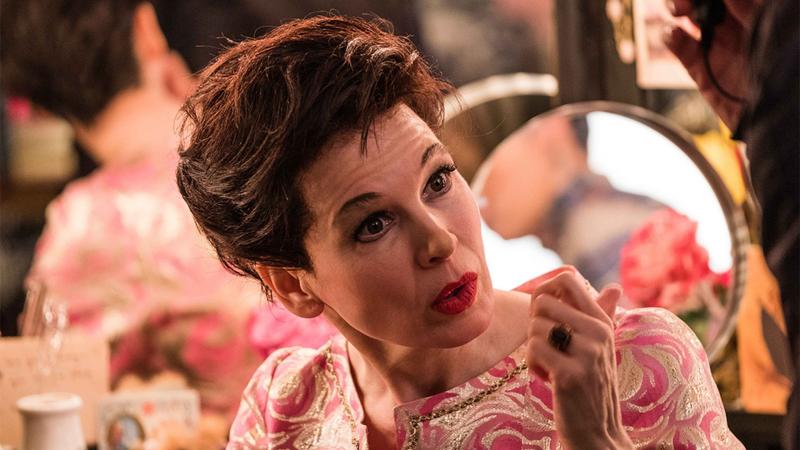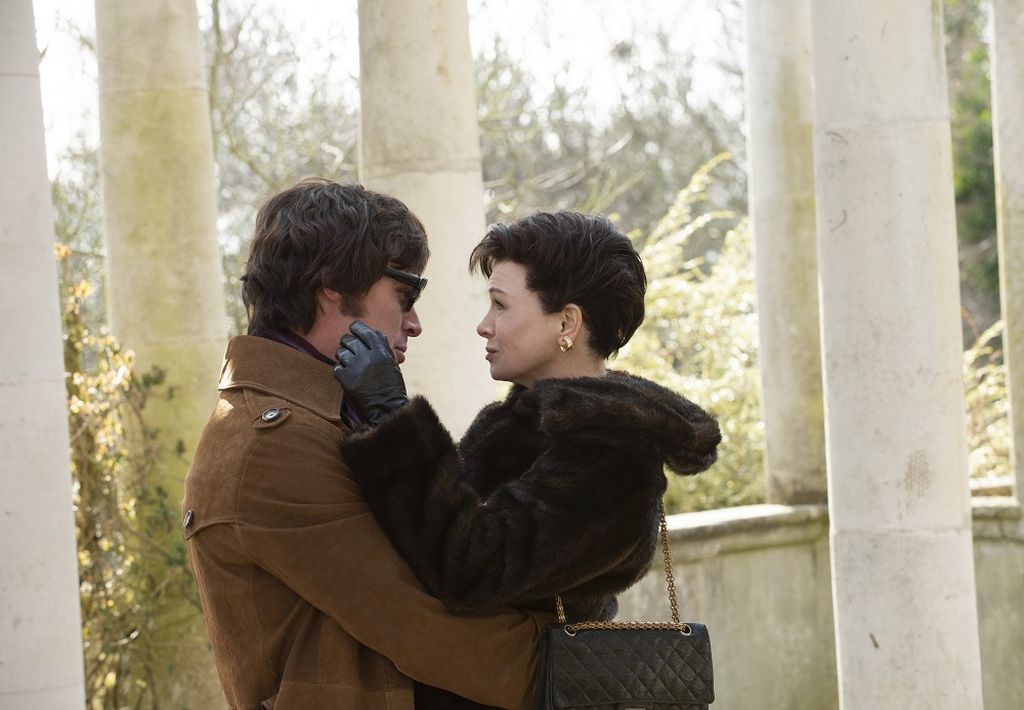Judy review - Renée Zellweger's bravura screen comeback | reviews, news & interviews
Judy review - Renée Zellweger's bravura screen comeback
Judy review - Renée Zellweger's bravura screen comeback
The 'Cold Mountain' star makes a spectacular case for a second Oscar

“She sang from her soul,” Judy Garland’s youngest daughter, Lorna Luft, once said of her world-renowned mum. So it’s right to give the role of this legendary entertainer to Renée Zellweger, an actress who, in the new biopic Judy, acts from her soul.
What’s especially gratifying is that the movie surrounding Zellweger is as good at she is. Marking only his second feature film, the redoubtable theatre director Rupert Goold (Ink, King Charles III) displays a deep connection to the material, not least in capturing the mores of an age in which his heroine’s quest for kindness and compassion was at odds with the self-destructive impulse that cut short her life in 1969 at age 47 in London’s Chelsea. That, in turn, was a mere three decades on from the eternal yearning Garland brought to the screen in The Wizard of Oz, and, yes, the film does include "Over the Rainbow".

No mere one-person parade, Tom Edge’s finely tuned screenplay finds the human ebb and flow in the dark, seemingly-deserted London to which a homeless Garland fled to recoup her losses during a contentious season at The Talk of the Town, leaving her two younger children behind in the American care of the third of her five husbands, Sid Luft (Rufus Sewell). Daniel Cerqueira and especially Andy Nyman, who seems to be everywhere these days, are wonderful as two gay men who are seen taking Judy into their hearts – and home. New York stage actor Finn Wittrock, (Pictured above) playing husband number five Mickey Deans, neatly captures the excitement, and danger, of finding himself in thrall to a personality at once exuberant, needy, and fatally self-lacerating.
Liza Minnelli, Garland's eldest daughter, gets a fleeting cameo (Gemma-Leah Devereux takes that role), while her half-siblings Lorna and Judy mostly exist to be abandoned by their fretful yet clearly adoring mum: a climactic phone conversation to them from a London call box (remember them?) makes one wonder how an impecunious Garland had enough small change to call Los Angeles. (More to the point, why doesn't she call from her hotel suite and let impresario Bernard Delfont, here played by a stern-faced Michael Gambon, foot that bill?)
The songs, some achingly familiar and others less so, are sung by Zellweger herself, a onetime (and brilliant) screen Roxie in Chicago who may not quite capture Garland’s uniquely burnished sound – on that front, Bennett has the edge – but entirely finds the amalgam of fragility and fury that drove the entertainer forward for as long as was possible. Best of all, entering territory encrusted with the trappings of camp, Goold and his leading lady pare all that away to peer deep into the heart of darkness that overtook a shining talent whose lustre is at once honoured and amplified by this film.
The future of Arts Journalism
You can stop theartsdesk.com closing!
We urgently need financing to survive. Our fundraising drive has thus far raised £49,000 but we need to reach £100,000 or we will be forced to close. Please contribute here: https://gofund.me/c3f6033d
And if you can forward this information to anyone who might assist, we’d be grateful.

Subscribe to theartsdesk.com
Thank you for continuing to read our work on theartsdesk.com. For unlimited access to every article in its entirety, including our archive of more than 15,000 pieces, we're asking for £5 per month or £40 per year. We feel it's a very good deal, and hope you do too.
To take a subscription now simply click here.
And if you're looking for that extra gift for a friend or family member, why not treat them to a theartsdesk.com gift subscription?
more Film
 Blu-ray: Wendy and Lucy
Down-and-out in rural Oregon: Kelly Reichardt's third feature packs a huge punch
Blu-ray: Wendy and Lucy
Down-and-out in rural Oregon: Kelly Reichardt's third feature packs a huge punch
 The Mastermind review - another slim but nourishing slice of Americana from Kelly Reichardt
Josh O'Connor is perfect casting as a cocky middle-class American adrift in the 1970s
The Mastermind review - another slim but nourishing slice of Americana from Kelly Reichardt
Josh O'Connor is perfect casting as a cocky middle-class American adrift in the 1970s
 Springsteen: Deliver Me From Nowhere review - the story of the Boss who isn't boss of his own head
A brooding trip on the Bruce Springsteen highway of hard knocks
Springsteen: Deliver Me From Nowhere review - the story of the Boss who isn't boss of his own head
A brooding trip on the Bruce Springsteen highway of hard knocks
 The Perfect Neighbor, Netflix review - Florida found-footage documentary is a harrowing watch
Sundance winner chronicles a death that should have been prevented
The Perfect Neighbor, Netflix review - Florida found-footage documentary is a harrowing watch
Sundance winner chronicles a death that should have been prevented
 Blu-ray: Le Quai des Brumes
Love twinkles in the gloom of Marcel Carné’s fogbound French poetic realist classic
Blu-ray: Le Quai des Brumes
Love twinkles in the gloom of Marcel Carné’s fogbound French poetic realist classic
 Frankenstein review - the Prometheus of the charnel house
Guillermo del Toro is fitfully inspired, but often lost in long-held ambitions
Frankenstein review - the Prometheus of the charnel house
Guillermo del Toro is fitfully inspired, but often lost in long-held ambitions
 London Film Festival 2025 - a Korean masterclass in black comedy and a Camus classic effectively realised
New films from Park Chan-wook, Gianfranco Rosi, François Ozon, Ildikó Enyedi and more
London Film Festival 2025 - a Korean masterclass in black comedy and a Camus classic effectively realised
New films from Park Chan-wook, Gianfranco Rosi, François Ozon, Ildikó Enyedi and more
 After the Hunt review - muddled #MeToo provocation
Julia Roberts excels despite misfiring drama
After the Hunt review - muddled #MeToo provocation
Julia Roberts excels despite misfiring drama
 London Film Festival 2025 - Bradley Cooper channels John Bishop, the Boss goes to Nebraska, and a French pandemic
... not to mention Kristen Stewart's directing debut and a punchy prison drama
London Film Festival 2025 - Bradley Cooper channels John Bishop, the Boss goes to Nebraska, and a French pandemic
... not to mention Kristen Stewart's directing debut and a punchy prison drama
 Ballad of a Small Player review - Colin Farrell's all in as a gambler down on his luck
Conclave director Edward Berger swaps the Vatican for Asia's sin city
Ballad of a Small Player review - Colin Farrell's all in as a gambler down on his luck
Conclave director Edward Berger swaps the Vatican for Asia's sin city
 London Film Festival 2025 - from paranoia in Brazil and Iran, to light relief in New York and Tuscany
'Jay Kelly' disappoints, 'It Was Just an Accident' doesn't
London Film Festival 2025 - from paranoia in Brazil and Iran, to light relief in New York and Tuscany
'Jay Kelly' disappoints, 'It Was Just an Accident' doesn't
 Iron Ladies review - working-class heroines of the Miners' Strike
Documentary salutes the staunch women who fought Thatcher's pit closures
Iron Ladies review - working-class heroines of the Miners' Strike
Documentary salutes the staunch women who fought Thatcher's pit closures

Add comment